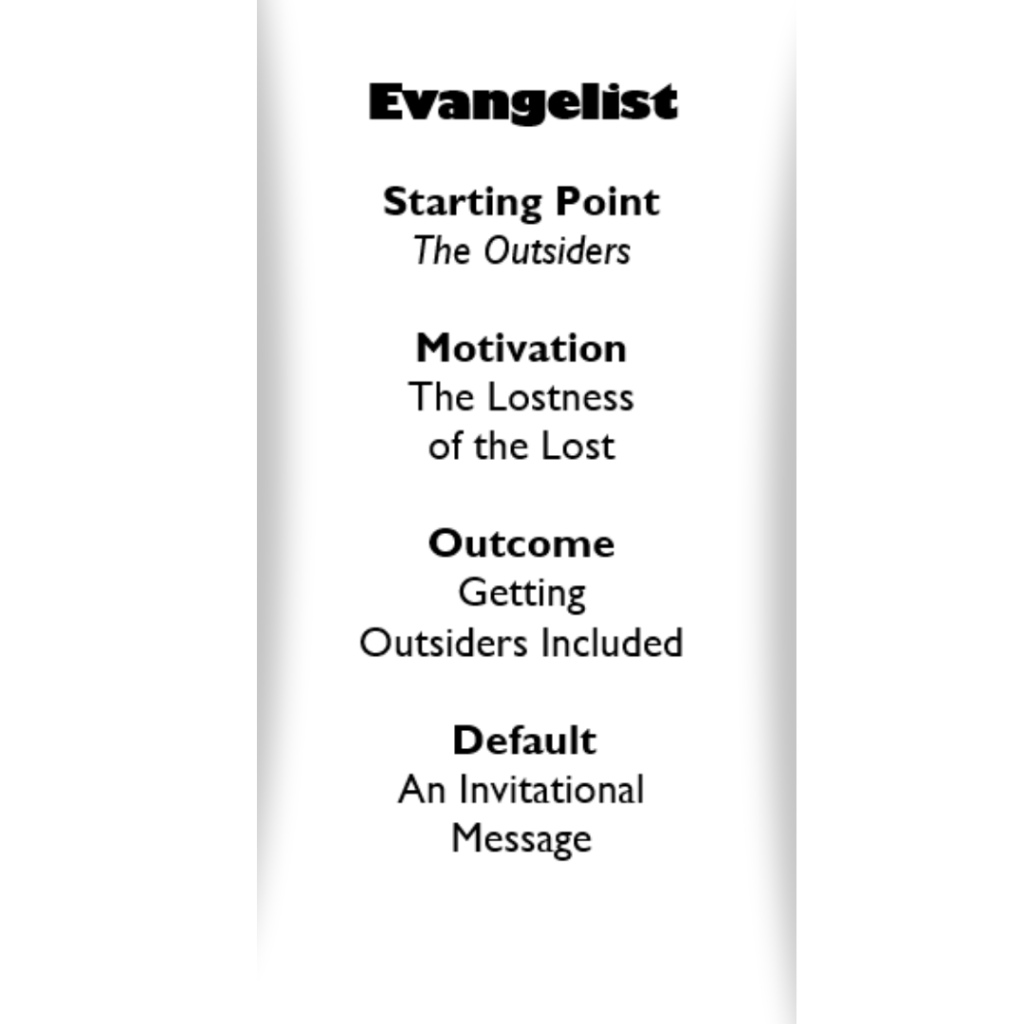In my previous post I suggested that after years of teaching students to preach the way I was taught to preach (assign a text, which fit me well as a “teacher” on five-fold), I started to wonder, “Am I trying to force apostles, prophets, evangelists, and shepherds, to preach like teachers?”
To put it more positively, I began to imagine, “What would it look like if apostles were freed to preach as apostles? Prophets like prophets? Evangelist as evangelist? Shepherd like shepherds? And teachers as teachers?”
In this post, I want to share what I have observed to be the unique starting point, motivation, outcome, and default message of each of the five-fold. My hope is that these observations will free us to be truer to how God wired us when invited to proclaim God’s truth.
Apostles
Alan Hirsch, in The Forgotten Ways, suggest that apostles (“sent ones”), ensure that the faith is transmitted from one context to another and from one generation to the next. They are always thinking about the future, bridging barriers, establishing the church in new contexts, developing leaders, and networking trans-locally.
As such, Apostles are less likely to start the proclamation task with a specific text than with a picture of a missional frontier in mind. They are motivated by the possibility of tackling that challenge, and their desired outcome is to get people engaged in tackling that challenge. Left to their own, then, an apostle will default to a motivational and movemental message.

Prophets
Prophets too, may not start the proclamation task with a specific text in mind. Hirsch says prophet’s know God’s will and are particularly attuned to God. As such, they bring correction and challenge the dominant assumptions we inherit from the church or culture. They insist that the community obey what God has commanded. They question the status quo.
Prophets are most likely to start the proclamation task with the voice of God and what they hear God saying to them. This may be a direct word or through a biblical text God has drawn them to. Their motivation in proclamation is for the listener to have an encounter with what God is saying to us… at this moment. And, their desired outcome is to get individuals or a whole community to change in some way. Left to their own, then, prophets will bring a challenging message.

Evangelists
Like many apostles and prophets, many evangelists do not respond with joy when assigned a text to proclaim. Hirsch suggests evangelists are infectious communicators of the gospel message who recruit others to the cause of Christ. They call for a personal response to God’s redemption in Christ, and draw people into the mission of God which leads to the growth of the church.
In the proclamation process, it is the instinct of evangelist to start with the needs of the outsiders, especially their need for Christ. Their greatest motivation in proclamation is the lostness of those who do not yet know Jesus. And, their desired outcome is to get outsiders included into the family of God in some way. As such, left to their own, an evangelist is going to deliver an invitational message.

Shepherds
On the whole, shepherds welcome being assigned a text to proclaim. This may be due to the close connection Paul sees between shepherds and teachers in Ephesians 4. Yet, as the caregivers of the community, they focus the text on the protection and spiritual maturing of God’s flock, more than on mining the depths of a text. Hirsch points out that shepherds cultivate a loving and spiritually mature network of relationships, making and developing disciples.
In the proclamation process, it is the instinct of shepherds to start with or move quickly to the needs of the insiders, allowing them to significantly shape the message. Their greatest motivation in proclamation is the needs and hurts of the community. And often their desired outcome is to get the sheep’s needs met and wounds healed. As such, left to their own, a shepherd is going to deliver a nurturing message.

Teachers
Of course, teachers love the challenge of being handed a text, any text, to proclaim. Hirsch says that teachers love to understand and explain. They help individuals remain biblically grounded, guide others toward wisdom, and help the community remain faithful to God’s word, all the while constructing a shared doctrine.
Teachers get their motivation from what scripture say. The desired outcome for a teacher is that the listeners understand what the text means. Left to their own devices, a teacher will proclaim and instructional message.

My hope is that these observations might free you to be truer to how God wired you as a proclaimer of God’s truth. The danger is, however, that in your freedom you choose to fly alone, in isolation, apart from the flock.
Independence is, of course, the opposite of Paul’s intent in Ephesians 4. So, before we end this blog series, we must notice that each of the five-fold is only truly free to thrive as it is wired, when it submits to the others. It is this idea I wish to examine in the final post in this series.
Join a Fall 2019 Learning Cohort

Share this Post

